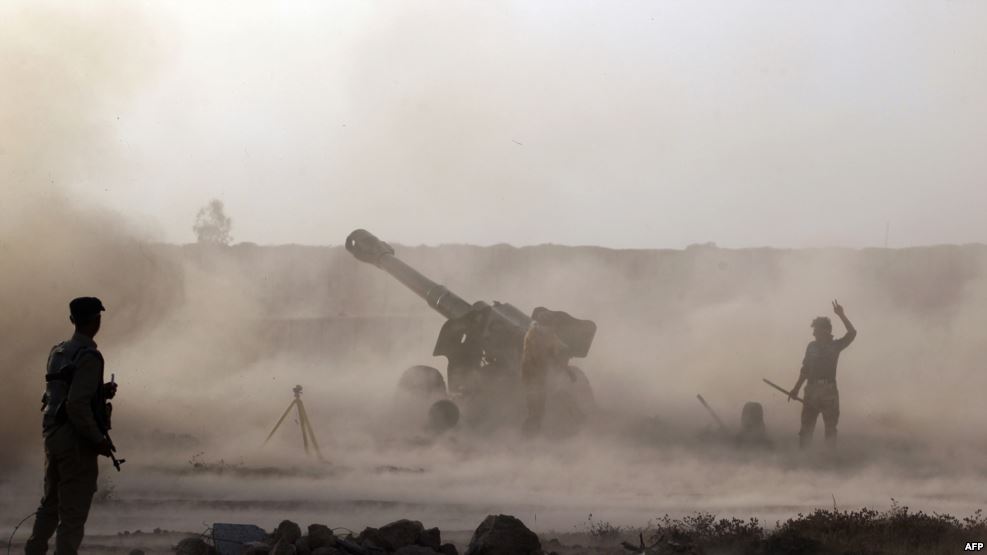Fallujah is one of the last remaining large cities under the Iraqi part of what IS calls its "caliphate." Lying only 65 kilometers from Baghdad, it is also of considerable strategic importance. An attack was inevitable. But its timing is interesting.
Iraqi Prime Minister Haidar al-Abadi needs a win. He is perceived as weak. Since taking over from Nouri al-Maliki, who fractured Iraq's already fragile political unity with his vicious sectarianism, Abadi has been unable to bring either political stability or security to Iraq. This is painfully highlighted by the recent spate of bombings in Baghdad -- the latest coming only last week, when Sunni terrorists associated with IS killed at least 70 people in a largely Shi'ite district.
But there is a broader issue at work here. While the ISF has been taking the fight to IS, it is the Shi'ite militias -- notably those under the main umbrella group, Al-Hashd Al-Sha'abi (The Popular Mobilization or PMU) -- that have dominated the fight against the terror group over the past couple of months or so, specifically the conflict around Fallujah.The infighting between the ISF and PMU is intense and some form of de-escalation is needed, but it's not clear whether this battle will help accomplish that or just make things worse.
Iraq In Microcosm
The Shi'a militias themselves are far from homogeneous, with many overtly Iranian proxies like Asa'ib Ahl al-Haq, Harakat al-Abdal and, most prominently of all, Kata'ib Hizballah in the field alongside militias like Firqat al-Abbas and Liwa Ali al-Akbar – which are loyal to Iraq's top Shi'ite cleric, Ali al-Sistani, who rejects Iranian influence in Iraq.
Iraq's other leading Shi'ite cleric is the infamous Muqtada al-Sadr, whose militia, Saraya al-Sala'am, is also involved in the battle for Fallujah and has also fallen out with the Iranians. Perhaps no figure in Iraq is more synonymous with sectarian tension that Sadr, who in 2013 described Iran's Islamic Revolutionary Guards Corps (IRGC) commander Qasem Soleimani as "the most powerful man in Iraq."
According to Smyth, it's clear from open-source materials that it is the Iranian proxies calling the shots in the advance on Fallujah, but the other organizations do have a degree of independence. The result is, of course, a mess: it's Iraq in microcosm, with a seemingly endless number of sectarian groups with varying networks of external allegiances vying for control.
But there is a potential positive: When you have a mix of different, often opposed, forces then one way you can de-conflict these groups is through a concerted, combined campaign against a common enemy. While it failed to achieve its ultimate objective, Market Garden is an example of the coordination of such a mix of commanders and troops -- although they were not hostile to one another. The battle to take Fallujah is a strategic necessity but it's also an attempt to deal with the sectarian and logistical problems facing Iraq's armed forces.
And this problem will have to be dealt with. As much as the Iraqi government and Washington would love to rid themselves of the problem of the Shi'ite militias, they simply can't. The militias have proved to be one of the most effective 'pro-government' fighting groups on the ground -- far better than the ISF. In addition, they have infiltrated many government units and are also strongly present in the social and political spheres -- the militias have everything from popular songs to their own NGOs to members in the Iraqi parliament. They have built a diverse multitude of support bases within Iraq.
Beat Them Or Join Them
For the Iraqi government it's either beat them or join them; and it is not going to be able to beat them any time soon. But the fact that so many of these groups answer to the Iranians makes governing the country even harder.
Abadi and the United States badly need a win in Fallujah, but so do the militias. The ISF needs to show the Iraqi population that it is a strong national force -- it is not -- and Washington is desperate for them to prove this as well.
Meanwhile, the militias want to continue to demonstrate that they are in fact the forces that are saving Iraq from Islamic State. This is a narrative that the Iranians are also strongly pushing: it's good geopolitical propaganda for them across the Middle East. According to Smyth, the Iranian message is clear: "It's our proxies' forces that are defeating [IS]. The United States says it wants to fight IS but what has it really done? In fact it has an ulterior motive, and that is simply to get more Iraqis killed.”
Along with their fighting prowess, the Shi'ite militias bring with them their own sectarian baggage, which complicates the process of re-taking Fallujah – a staunchly Sunni city. The animus between Sunni and Shi'a, exacerbated by Maliki, has only increased due to the often brutal tactics of the militias towards their Sunni fellow Iraqis. When the militias retook Tikrit from IS late last year they deliberately set about destroying hundreds of homes and shops in the city as well reportedly abducting 200 Sunni residents -- 160 of whom still remain unaccounted for.
The Sunnis don't forget. Indeed, part of the reason that IS gained so much traction in Iraq in the first place is that the anti-Sunni policies of the Iraqi government and behavior of the Shi'ite militias drove many Sunni Iraqis into its arms.
The residents of Fallujah are trapped. Islamic State is using them as human shields against the air and ground attacks that began on May 23, but they also know that if Islamic State is defeated then what is coming may be almost as bad.
Source http://www.rferl.mobi/a/tracking-islamic-state-fallujah-battle-sectarianism/27757155.html


 RSS Feed
RSS Feed